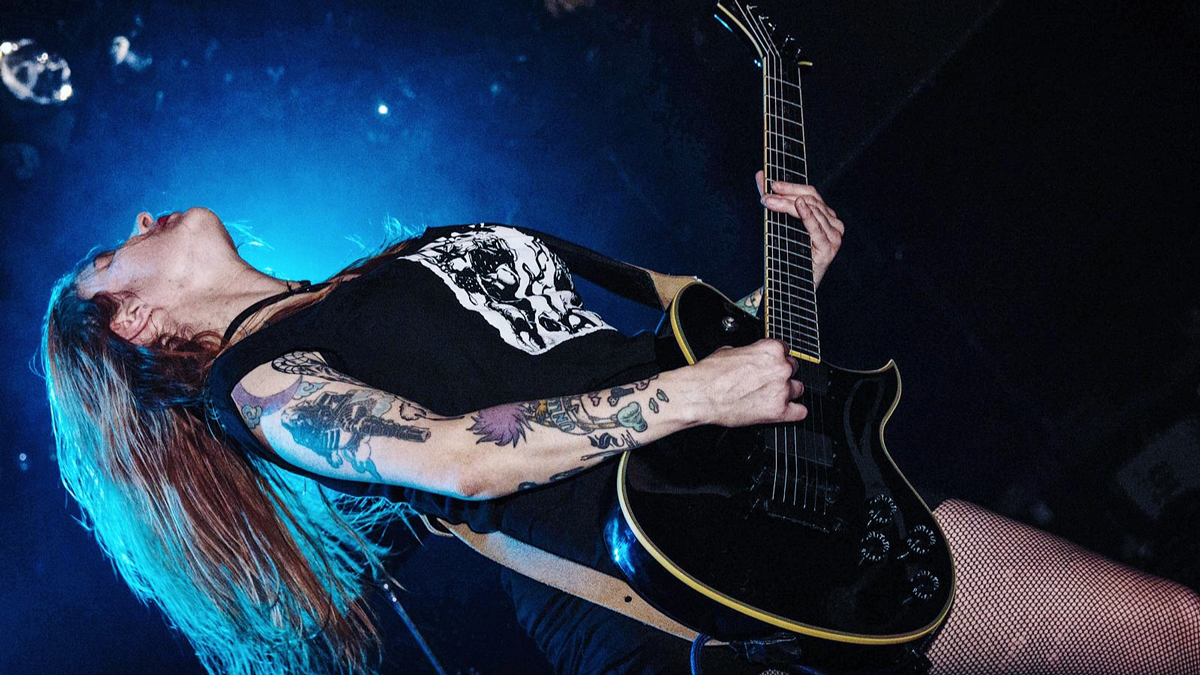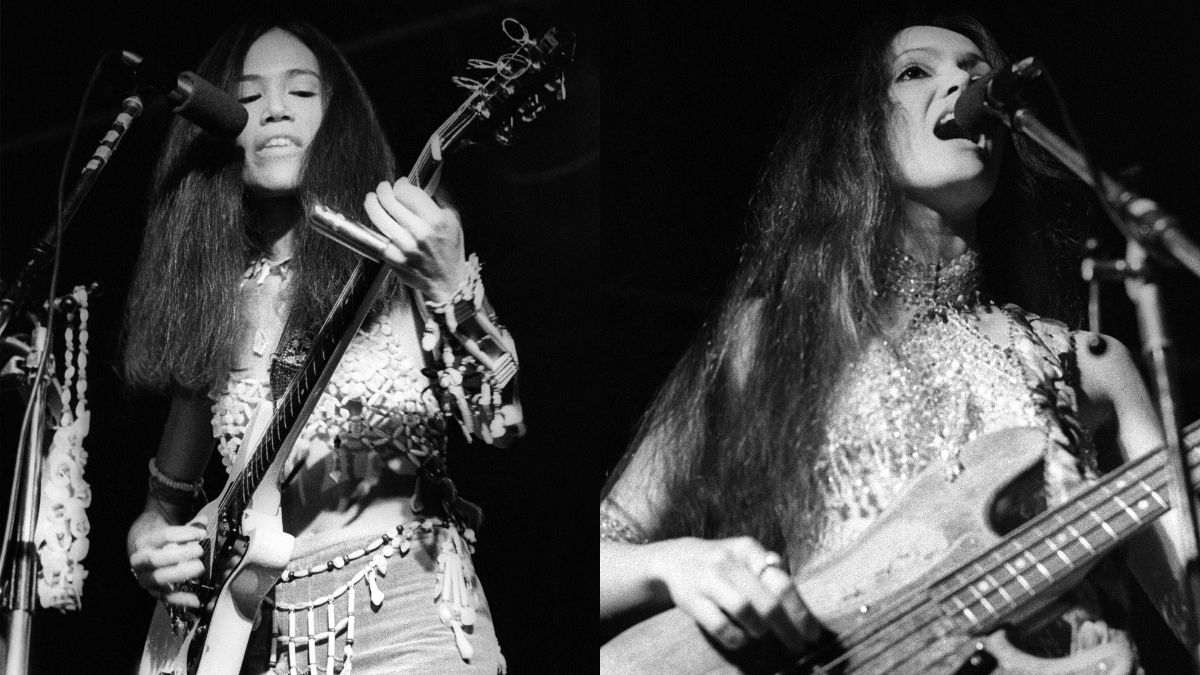Noctule's Serena Cherry: “The leads on this album are a window into my personality – they're euphoric, but also heavy”
The Svalbard guitarist explains how her love of The Elder Scrolls V: Skyrim informed her debut solo album Wretched Abyss, and why she's a huge power-metal nerd

All the latest guitar news, interviews, lessons, reviews, deals and more, direct to your inbox!
You are now subscribed
Your newsletter sign-up was successful
Though Svalbard guitarist Serena Cherry often incorporates black metal-inspired tremolo picking into her technique, the dramatic swings of the Bristol, UK unit’s latest LP, When I Die, Will I Get Better?, also branch off into blunt force hardcore chugging and melodious post-rock texturalism.
When it comes to Wretched Abyss, the upcoming debut from Cherry’s new Noctule project, the English guitarist/programmer streamlines her love for delay-decayed trills in a decidedly more traditional – and brutal – black-metal fashion.
But where the original corpse-painters might have taken influence from their Nordic surroundings, ground-down Noctule workouts like Elven Sword and Labyrinthian take both thematic and musical cues from the digital plains of role-playing game The Elder Scrolls V: Skyrim.
“Soundtracks and black metal go hand-in-hand,” Cherry says. “It’s never a surprise when you hear that a black-metal fan also listens to classical music, or loves the Lord of the Rings soundtracks, or plays RPG games, because those worlds just seem to mesh so perfectly.”
Speaking with Guitar World, Cherry weighed in on how the pandemic, video game scores, and – perhaps, subconsciously – the fanciful spirit of power metal contributed to the “epic hopefulness” of her Wretched Abyss.
How long had you been working on Noctule before deciding to put this big focus on it via Wretched Abyss?
“I’ve always had black-metal riffs lying around, either in my head or written down in my little riff book, but it wasn’t until the UK went into lockdown because of COVID-19 that I actually had the time to put them into songs.
All the latest guitar news, interviews, lessons, reviews, deals and more, direct to your inbox!
“It’s been the silver lining of the pandemic: I finally have the time to work on the riffs. Some of these riffs I’ve had for five or six years, but never had the time to fully develop them, or they weren’t the right sound for Svalbard.”
In certain regards, Noctule and Svalbard paint the canvas is a similar way – I’m thinking those blown out, yet crystalline reverbs and delays; some of the tremolo work – but, arguably, the boundaries are more clearly defined with Noctule. What can you say about dialing into a more stylized black-metal aesthetic?
“I’m completely self-taught. I learned how to trem pick and then basically went, ‘That’s it, that’s what I want to do!’ The biggest compliment I ever received as a guitarist was someone saying my trem picking is so even. And I like to drench everything I play in a very short delay, so that it gives it that blurriness.
Writing this album was a huge learning process for me. Normally I just write riffs. I’ve never had to sit there by myself and turn them into an entire song
“A short delay along with the trem picking is the ideal combination for playing black metal; it gives it that smooth sound. Also, I’m all about the dueling guitar leads – two melodies intertwining. I really got to go mad with that in Noctule.”
Songs like Labyrinthian, Wretched Abyss and Evenaar definitely deal with those dual lines – meshing at an octave apart, before veering off from one another, and then uniting again...
“Writing this album was a huge learning process for me. Normally I just write riffs. I’ve never had to sit there by myself and turn them into an entire song. I was intertwining those leads – finding the points where they met, and the points where they come apart and go into their own different worlds.
“It was about that tension and release, but also learning that not everything has to be intense dual melodies and harmonies all the time. That was a huge learning process for me, but I do really love that – I think it’s quite clear at the end of each song. I let loose!
“That’s when it reaches the climax and all the orchestrated moments of guitar come together. I’m really influenced by classical music and soundtracks, and I think you can really hear that in the endings of these songs.”
The project is thematically linked to the Elder Scrolls V: Skyrim videogame – you’d previously explained that Labyrinthian is based on your favorite dungeon in the game; the title track is about the character of Hermaeus Mora – but how influential is the Skyrim score to Noctule’s music?
“Jeremy Soule’s score for Skyrim is my favorite piece of music of all time. I just think it’s absolutely beautiful, the epic-ness of its melodies. I was searching for a similar feeling while I was writing this.
“Some sections of the original Skyrim soundtrack are quite sorrowful, but give way to these evocative melodies. It was something that I was trying to recapture in a metal way. It’s probably one of the most influential pieces of music in my life.”
As you mentioned, you’ve held onto some of these riffs for years. If they hadn’t been right for Svalbard, what makes them work for Noctule?
“It’s just unashamedly melodic. This might sound cheesy, but Noctule comes straight from my heart. There’s no editing involved, I don’t sit there and go, ‘Right, what would a Svalbard fan want to hear?’ It’s just me.
I wasn’t even going through an amp, just the plugins, which was something that was new to me. I basically learned how to use Logic to make this record
“If anyone wants a little window into my personality, it’s the leads on this album – the way that they’re euphoric, but also heavy. I play quite aggressively, but they’re soaring. There’s an epic hopefulness to it, which probably isn’t very black metal [laughs].”
How different is your equipment set up between the two projects?
“With Svalbard I use a Washburn Idol and a [Boss] DD-7 delay – that’s probably the similarity, I use a short delay time on both [projects]; I use a [Boss] RV-5 on the modulate setting and an RV-6 on the shimmer setting, and I alternate between the two.
“I also use an Orange Dual Terror head. I mean, it’s tiny – the same size as my toaster – but it’s amazing. I’ve used it for 10 years and never had an issue with it. It’s incredible.
“For Noctule, I use a Jackson Soloist with EMGs – it’s one of the first proper guitars I ever bought, and I love it. I also play with a different tuning. In Svalbard, I’m in drop C; in Noctule, it’s all standard or drop D. In terms of the guitar sound, I was using Neural DSP’s Archetype Nolly on Logic, and Waves for post-processing.
“I wasn’t even going through an amp, just the plugins, which was something that was new to me. I basically learned how to use Logic to make this record.
“In terms of the delay and the reverb, it’s a lot more scaled-back for Noctule, because I wanted a slightly more aggressive, black-metal sound. I didn’t want it to have the same shimmery leads as on Svalbard. It basically said 'reverb' and 'delay' [on my screen] so I just clicked on it and turned it up [laughs].”

You played everything on the album, but you have a backup band with you in the video for Wretched Abyss.
“I’m really lucky in that I live with a bunch of metalheads. Basically what had happened was that my housemate heard me writing the album and said, ‘Oh, I love those riffs!’
“Then we got together in the practice room. My partner Matt [Francis] is on guitar; he actually mixed and mastered the record. My housemate Rhys Griffiths is on drums, he used to play in Extreme Noise Terror. We are currently in between bassists.“
You recently posted on Instagram that you’d been feeling uninspired, guitar-wise, which led you towards learning some Gloryhammer songs. While there are some triumphant moments to Noctule’s music, what has diving into hyper-charged power metal done for your spirit?
“Outside of black metal, I’m a huge power-metal nerd. I’ve always maintained that if I was a good enough musician, then I would play in a power-metal band. Unfortunately, I don’t think I have anything to bring to this table that is already brimming with so much talent. But I love learning! I did try some Hammerfall as well.
“If you ever get stuck with playing guitar, learning some power metal will make you happy. It reminds you to enjoy your instrument, rather than being frustrated with it. It definitely brought me out of that frustration.”
- Wretched Abyss is available to preorder now via Church Road Records.
Gregory Adams is a Vancouver-based arts reporter. From metal legends to emerging pop icons to the best of the basement circuit, he’s interviewed musicians across countless genres for nearly two decades, most recently with Guitar World, Bass Player, Revolver, and more – as well as through his independent newsletter, Gut Feeling. This all still blows his mind. He’s a guitar player, generally bouncing hardcore riffs off his ’52 Tele reissue and a dinged-up SG.

